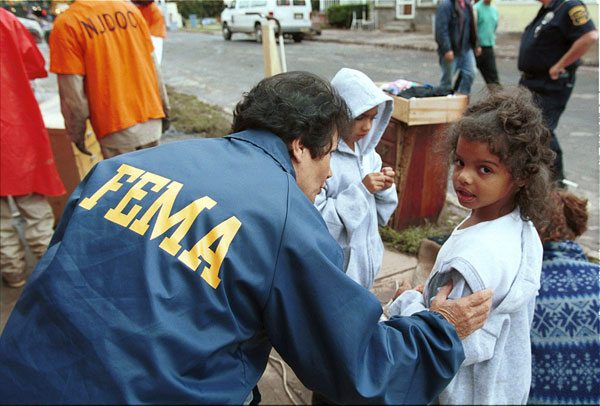
October 15, 2017; Associated Press and the Advocate
For communities and lives disrupted by natural disasters, Federal Emergency Management Agency (FEMA) funding of local government and nonprofit organizations is the fuel that powers cleanup and recovery. As critical as this funding is for communities facing unexpected and expensive emergency costs, FEMA’s history suggests that in the midst of crisis and great need, there is also a need to be cautious and careful. All that glitters may not be gold.
An Associated Press review of FEMA records found that “some local governments and nonprofit organizations could get less than they were told to expect from the Federal Emergency Management Agency. Others could be asked years from now to repay some or all the aid they received, if FEMA concludes the projects failed to comply with its voluminous requirements or decides it shouldn’t have approved the payouts in the first place.”
The Associated Press conducted its review by examining more than 900 final appeal rulings.
In one-third of those cases, FEMA granted some or all of the requested funding, totaling about $250 million. Two-thirds of the appeals were rejected, probably totaling well more than the $1.2 billion tallied by the AP because the amounts denied were unclear in FEMA’s online records for more than 100 cases.
Sign up for our free newsletters
Subscribe to NPQ's newsletters to have our top stories delivered directly to your inbox.
By signing up, you agree to our privacy policy and terms of use, and to receive messages from NPQ and our partners.
Keeping accurate records may seem a frivolous waste of time when faced with immense human suffering, but failing to document expenditures can prove very costly. Having failed to provide proper documentation, a Miami suburb has been asked to repay FEMA $2 million in grants that were funded decades ago. The mayor of Sweetwater, Florida told the AP that his “advice…is document, document, document. Cross your t’s, dot your i’s and back up everything.”
Cash-starved organizations need FEMA commitments quickly if they are going to be able to respond immediately to the devastation. Yet, FEMA reserves the right to rethink its initial decisions about what expenses it will pay for, even after it has written a check. The risk in trusting can be very high. Dimitre Blutcher directed a Louisiana-based organization serving HIV/STD patients. According to the AP story, “her group’s HIV clinic and main office were devastated by flooding and winds from Katrina in 2005.”
Days after the storm…FEMA asked her to continue providing services to clients. FEMA paid the group $105,600 for its work, which included the long process of reconstructing clients’ files after the paper records were destroyed.… FEMA and state officials led her to believe the clinic would qualify for additional money, so she took out a bank loan and line of credit while awaiting reimbursement for her costs, which grew to $280,000. But FEMA reversed course in 2011, saying it would not provide any more reimbursement and ordering the group to repay the initial $105,600, too. The clinic soon closed its doors.
From FEMA’s perspective, they have been entrusted to protect scarce public funds and ensure they are properly expended. Otherwise, you get cases like this one, reported in the Advocate, of a Baton Rouge man who “pleaded guilty to stealing more than $26,000 in Federal Emergency Management Agency funds earmarked for victims of the catastrophic August 2016 flooding in the area…[filing]…a fraudulent claim with FEMA seeking disaster assistance funds for a home in the city that he claimed was his primary residence [but] was renting…to a tenant.”
The need to act quickly in the face of a disaster cannot be ignored. FEMA’s complex bureaucracy will not deter governments and nonprofits from responding to the immense human need they face. Federal funding will remain critical to their ability to rise to the challenge, even with the risks that come with it. They just need to have their eyes open and stay careful and cautious. FEMA would do well to improve its systems, honor its commitments, and recognize that in the face of chaos, “normal” business practices may not be possible.—Martin Levine












